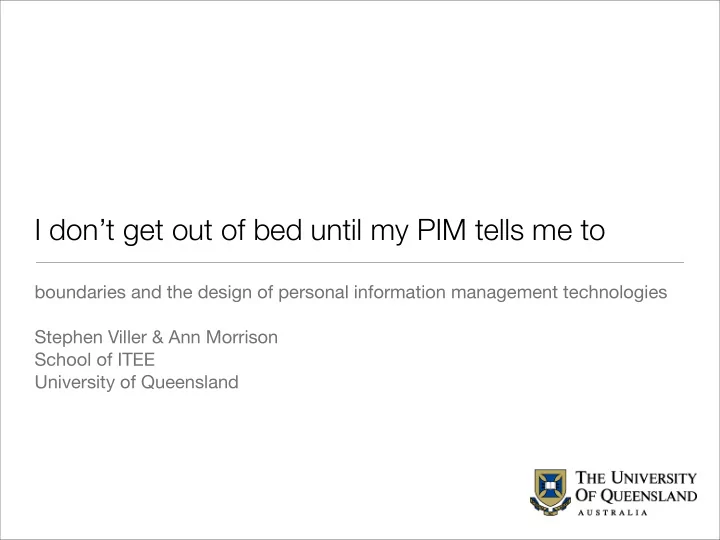

I don’t get out of bed until my PIM tells me to boundaries and the design of personal information management technologies Stephen Viller & Ann Morrison School of ITEE University of Queensland
overview • managing personal information • design problem • boundaries • concepts • design process simtech workshop, Melbourne, November 26-27 2007
setting the scene • Challenge of managing personal information across multiple boundaries • multiple sources • multiple media • multiple platforms • multiple locations • through use of mundane technologies simtech workshop, Melbourne, November 26-27 2007
design problem • Personal information management (PIM) for everyday life simtech workshop, Melbourne, November 26-27 2007
design problem • Personal information management (PIM) for everyday life • PIM has traditionally been treated as a workplace concern • scheduling meetings • managing to-do lists • collaboration • awareness • privacy simtech workshop, Melbourne, November 26-27 2007
design problem • Personal information management (PIM) for everyday life • PIM has traditionally been • Some have examined how PIM treated as a workplace concern could be extended to domestic settings • scheduling meetings • locations in the home • managing to-do lists • patterns & routines • collaboration • ownership • awareness • coordination • privacy simtech workshop, Melbourne, November 26-27 2007
design problem • Personal information management (PIM) for everyday life • PIM has traditionally been • Some have examined how PIM treated as a workplace concern could be extended to domestic settings • scheduling meetings • locations in the home • managing to-do lists • patterns & routines • collaboration • ownership • awareness • coordination • privacy simtech workshop, Melbourne, November 26-27 2007
boundaries • Home ⇔ work • switching contexts; similar issues with work ⇔ work • Individual ⇔ social • merging family schedules • Physical ⇔ digital • affordances of paper, tangible interaction, visualisation • Online ⇔ offline • when ‘anywhere, anytime’ breaks down • local ⇔ remote • collaboration mediated by artefacts, same place/different places simtech workshop, Melbourne, November 26-27 2007
some concepts • Prime time carer • social computing where some are more equal than others • ownership • Visually mapping • presenting information for at-a-glance identification of conflicts, etc. • sharing schedules to facilitate planning • awareness at a micro level (twitter, facebook status) • Messy deployment • legacy, individual preferences, organizational requirements • work with existing infrastructure • Multiple methods • reflective, iterative, fieldwork, prototypes simtech workshop, Melbourne, November 26-27 2007
design process sms others location mail you integration with awareness calendar current technologies scheduling stickies Functionality IM messaging patterns privacy current Design routines practice considerations portability concerns habits Iterative Design Process Cycle workflow configurabliity Prior life balance Identify bridge Knowledge work home community digital/ social individual of practice physical remote local exploration Field focus work evaluation of design Design Map for: deploy Design interventions Personal Information Management simtech workshop, Melbourne, November 26-27 2007
summary • Domestic setting is handy for thinking about this, but the problem is more complex than just translating workplace technology to the home • nuclear family also only small part of the picture • extended family, non-blood extensions to family • multiple boundaries exist • not orthogonal--many overlaps • useful way to focus design on particular aspects of the whole problem • technology adds to the messiness of everyday life • waiting for google to fund this... simtech workshop, Melbourne, November 26-27 2007
Recommend
More recommend